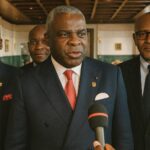Kintélé Executive Council: Momentum Builds
Few diplomatic gatherings in Central Africa have carried such a sense of pragmatic urgency as the twenty-fourth Executive Council of the African Petroleum Producers’ Organization, convened last week in the purpose-built conference city of Kintélé. Delegations from eighteen producer states scrutinised the organisation’s programme of work, but the spotlight remained fixed on a single item: operationalising the African Energy Bank, a project whose gestation has already spanned several ministerial cycles. Congolese hosts, led by Minister of Hydrocarbons Bruno Jean-Richard Itoua, underscored the political will “to move from concept notes to signed balance sheets before the end of the year” (APPo communiqué, 28 May 2024).
The council’s resolution tasks the secretariat with finalising the bank’s statutes and capital subscription model in time for an extraordinary summit of heads of state that Brazzaville is prepared to convene at short notice. In quiet conversations on the margins, diplomats suggested that the choice of headquarters—Lagos, Abuja and Brazzaville have all been floated—could be settled by consensus if Congo’s expedited timetable is respected.
Strategic Rationale for an African Energy Bank
The intellectual architecture of the future institution rests on a straightforward premise: Africa’s hydrocarbon reserves remain abundant, yet capital for upstream and midstream development is receding as global lenders tighten ESG criteria. According to the International Energy Agency, less than four percent of worldwide oil and gas investment was directed to African projects in 2023, down from seven percent a decade earlier (IEA World Energy Investment Report 2024). APPo ministers argue that a dedicated continental vehicle would cushion members against market cyclicality while channelling funds to gas-to-power schemes, pipelines and refineries that underpin industrialisation.
Observers in Kintélé stressed that the bank is intended to complement, rather than rival, existing multilateral lenders. Afreximbank, which has already signalled technical support and a potential equity contribution of up to one billion dollars (Afreximbank press release, 3 May 2023), is expected to provide treasury services during the start-up phase. The proposed initial authorised capital of five billion dollars may appear modest by global standards, yet officials contend that it could leverage as much as three times that amount through syndicated lending and green bond issuance.
Governance, Compliance and Environmental Safeguards
Questions of governance occupied a substantial portion of the closed-door deliberations. Draft articles seen by this writer outline a two-tier structure combining a council of shareholders with an independent board of directors recruited on the open market. Voting weights are slated to reflect subscribed capital but will be capped to prevent dominance by a single shareholder, an arrangement reminiscent of the African Development Bank’s charter. In Kintélé, Algeria and Angola both signalled willingness to accept the cap so long as strategic decisions—such as portfolio ceilings for non-fossil projects—require a super-majority.
Environmental stewardship, once a peripheral concern for producer states, now features prominently in the bank’s risk matrix. The working documents envisage mandatory climate-impact screening and a dedicated window for renewable project co-financing, a nod to the continent’s emerging hydrogen and critical-minerals agenda. As Minister Itoua put it, “Our resources must bridge today’s energy poverty without locking tomorrow’s generations into stranded assets.” That formulation, widely quoted in the corridors of the Kintélé International Conference Centre, captures the calibrated pragmatism Congo is keen to project.
Congolese Stakes and Regional Outlook
For Brazzaville, shepherding the bank from blueprint to reality offers multiple dividends. Domestically, the initiative dovetails with President Denis Sassou Nguesso’s strategy of consolidating Congo’s position as a regional energy logistics hub. The forthcoming Pointe-Noire LNG expansion and the long-discussed Trans-Congo oil pipeline both stand to benefit from concessional lines extended by a continental lender attuned to the nuances of Central African risk.
Regionally, Congo’s stewardship enhances its diplomatic profile at a time when geopolitical attention is skewing toward the Sahel and the Horn. By aligning with heavyweight producers such as Nigeria while maintaining cordial ties with non-OPEC newcomers like Senegal and Mozambique, Brazzaville positions itself as an honest broker across linguistic and ideological divides. Analysts at the African Energy Chamber suggest that this convening power could translate into increased negotiation leverage in OPEC-plus quota debates later this year (African Energy Chamber Market Report, 2024).
Implications for External Partners and Investors
Washington, Brussels and Beijing will read the Kintélé communiqué with a blend of curiosity and caution. European majors, already recalibrating portfolios toward gas and low-carbon ventures, may view the bank as an additional source of co-financing that could de-risk frontier exploration. China’s policy banks, historically dominant in African hydrocarbons, must now share the field with an indigenous player that aspires to export African capital discipline along with barrels.
Yet the venture’s success will hinge on investor confidence in its credit architecture. Rating agencies contacted in Paris noted that the institution’s callable capital model mirrors that of established multilaterals, potentially facilitating an investment-grade rating if early shareholders honour capital calls. A London-based project-finance lawyer summed up the prevailing sentiment: “The political symbolism is powerful, but only first-mover projects demonstrating predictable cash flow will lure international syndicates.” That sober assessment explains why Congo’s diplomacy is focused on marrying speed with rigor, ensuring that the bank’s inaugural deals become showcases rather than cautionary tales.




















